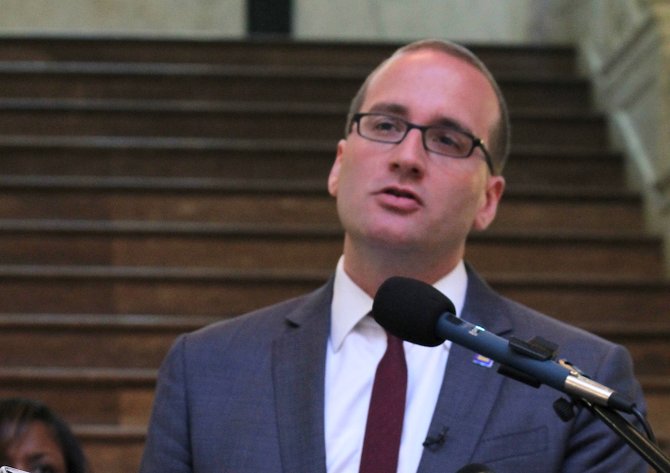Chad Griffin, HRC's president and a southern Arkansas native, cited the South's civil-rights legacy as one reason discriminatory state laws could soon be struck down. Photo by Melanie Boyd.
Nate Silver thinks he's so smart.
Just because the New York Times statistician nailed the 2012 presidential election results—and is generally right about everything else—everyone assumed Silver was also correct earlier this year when he predicted that Mississippi would be the last state to legalize same-sex marriage—in 2024.
But gay-rights advocates say that marriage equality might be on its way to the Magnolia State much sooner. On July 12, Washington, D.C.-based Human Rights Campaign published a study showing that Mississippians' attitudes about discrimination against same-sex-loving people are less conservative than previously thought.
HRC, the nation's largest LGBT advocacy organization, used two polling firms and found that 58 percent of Mississippians under age 30 support marriage equality. The poll also showed that 64 percent of adults in Mississippi would support legislation that protects LGBT employees from workplace discrimination. Currently, Mississippi law allows employers to explicitly punish workers who are openly gay.
Chad Griffin, HRC's president and a southern Arkansas native, cited the South's civil-rights legacy as one reason discriminatory state laws could soon be struck down.
"There is no reason why the South shouldn't be a leader," Griffin said.
Advocates for LGBT rights are celebrating two recent U.S. Supreme Court decisions validating same-sex unions that may have a wider effect in Mississippi and nationwide than previously thought.
In one case, which challenged the federal Defense of Marriage of Act, or DOMA, the court ruled that same-sex couples are entitled to receive federal benefits. In the other, the court declined to hear a case out of California, where a ballot initiative attempted to make same-sex marriage illegal after the state's Supreme Court found such discrimination unconstitutional in 2008.
As a result of the DOMA case, federal benefits will automatically go to couples in states that have already legalized same-sex marriage. The rulings do not overturn laws in states that have explicit prohibitions against same-sex marriages and civil unions. Among those states is Mississippi, which passed an amendment in 2004 that states "marriage may take place and may be valid under the laws of this state only between a man and a woman."
Although discrimination on the basis of sexual orientation is not constitutionally protected, LGBT advocates say Justice Anthony Kennedy's majority opinion elevates sexual orientation to quasi-protected status.
"The Constitution's guarantee of equality 'must at the very least mean that a bare congressional desire to harm a politically unpopular group cannot' justify disparate treatment of that group," Kennedy wrote in his ruling.
David Dinielli, deputy legal director for the Southern Poverty Law Center, said Kennedy stops short of creating a new protected class but does apply a "careful consideration standard," meaning the courts have an obligation to take a close look at laws that appear to have discriminatory intent.
"Justice Kennedy did not give it a name, and legal scholars will be asking the same questions in years to come," Dinielli told the Jackson Free Press.
Mississippi courts may be asking those questions sooner rather than later. On July 15, several same-sex couples challenged Mississippi's ban on same-sex marriage by applying for marriage licenses in several cities, Mississippi Public Broadcasting reported.
Two couples attempted to do so in Hinds County, but Circuit Clerk Barbara Dunn turned the couples away, citing state law.
The HRC's Griffin said the ruling in the DOMA case—United States v. Windsor—establishes the basis for what could be a deluge of same-sex discrimination suits.
"Every case that you're seeing that is already filed, and the cases that are going to be filed in the months and weeks to come, will all cite the majority opinion in the Windsor case," he told the JFP. "There's no question that ruling is our roadmap for the future."




Comments